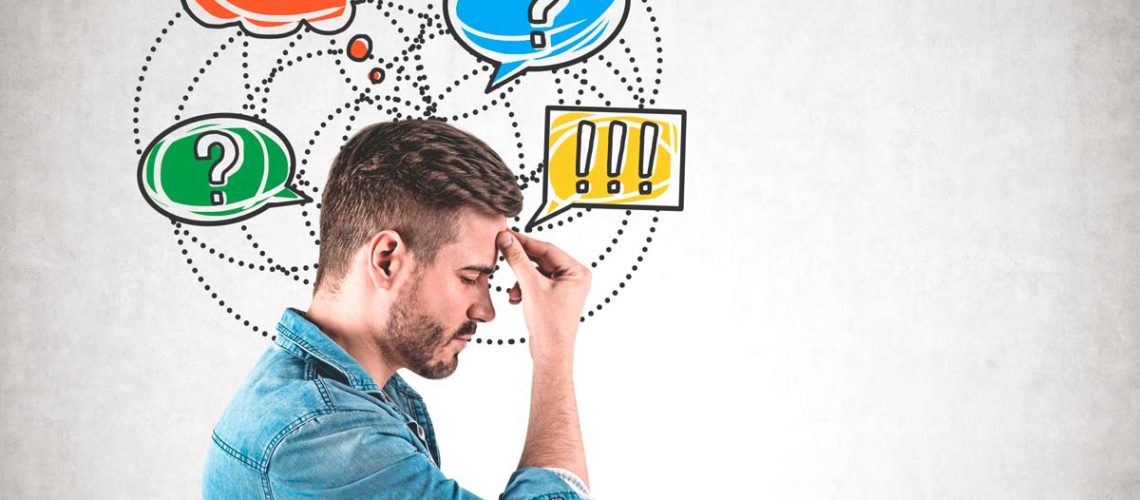Why making the right choice is difficult when you’re stressed
9 March 2021

Study by members of Synapsy, the Swiss National Centre of Competence in Research in psychiatric disorders, explains why we make poor decisions after stress even when motivated by the prospect of reward.
The ability to assess the costs and benefits of a particular action or type of behaviour is fundamental to survival for all living beings. Stress, however, is known to affect the ability to make the right decision.
A team led by Manuel Mameli from the Department of Fundamental Neurosciences (DNF) in UNIL’s Faculty of Biology and Medicine (FBM) and Synapsy associate member, has been conducting work in this area in collaboration with Claudia Bagni, DNF director and Synapsy researcher. In a study published in the journal Neuron, the scientists identify the neural mechanisms linked to the lateral habenula that lead to poor decision-making following a stressful event. The lateral habenula – a small structure located in the centre of the brain – plays an important role in processing negative stimuli and information as a type of “disappointment brain centre”.
Contact
Manuel Mameli
Associate Professor
Département des Neurosciences Fondamentales
Faculté de Biologie et de Médecine
Université de Lausanne
T : +41 (0)21 692 51 95
Manuel.Mameli@unil.ch
DOI
Study by members of Synapsy, the Swiss National Centre of Competence in Research in psychiatric disorders, explains why we make poor decisions after stress even when motivated by the prospect of reward.
The ability to assess the costs and benefits of a particular action or type of behaviour is fundamental to survival for all living beings. Stress, however, is known to affect the ability to make the right decision.
A team led by Manuel Mameli from the Department of Fundamental Neurosciences (DNF) in UNIL’s Faculty of Biology and Medicine (FBM) and Synapsy associate member, has been conducting work in this area in collaboration with Claudia Bagni, DNF director and Synapsy researcher. In a study published in the journal Neuron, the scientists identify the neural mechanisms linked to the lateral habenula that lead to poor decision-making following a stressful event. The lateral habenula – a small structure located in the centre of the brain – plays an important role in processing negative stimuli and information as a type of “disappointment brain centre”.
Stressed mice draw a blank
The researchers conducted an experiment on healthy rodents, giving them the choice to take one of two corridors in a maze. A reward was placed at the end of the first corridor in the form of food, whereas the end of the second corridor was non-rewarded. All the mice first took part in a task-habituation session and to familiarise them with the environment.
The next day, half of the mice were given small, unpredictable electric shocks to their legs. When it was time to repeat the exercise one week later, Alvaro Nuno-Perez – a DNF doctoral student and first author of the study – switched the system and placed the reward in the second corridor. The rodents that had been given a stress took the wrong path twice as often as the mice that had been left in peace, returning empty-handed and on an empty stomach.
“Disappointment centre” heavily involved
In the lateral habenula of the stressed mice, the research team discovered a downturn in the activity of the synapses – areas of contact between neurons that are designed to communicate between them. More specifically, the team found that the AMPA receptors, located on the surface of the synapses, were less efficient. “In other words,” begins Professor Mameli, “stress reduces the synaptic strength of the lateral habenula, and some neurons don’t perform so well, which increases poor decision-making and, it follows, disappointment. It’s as though the neurons no longer give the signal needed for the animal to say to itself: ‘You’re making the wrong choice: the food isn’t there any more – you need to change strategy’”.
Strengthening knowledge in neuropsychiatry
Professor Mameli and his group are currently reproducing their experiment in pathological conditions. They want to understand whether the results obtained with healthy individuals will be found in mice suffering from depression or addiction.
This research opens the door to a better understanding of certain neuropsychiatric disorders. “Whether in mice or humans, prolonged stress can induce depressive states,” explains Professor Mameli. “However, we do know that people with this illness find it very difficult to make decisions, and that they struggle to identify which choices are good or bad.” The study suggests that the lateral habenula could well be a target for therapeutic interventions in psychiatry.
by Mélanie Affentranger (FBM Communication Dept., UNIL)
Illustration: ©Denisismagilov, Dreamstime.com
Contact
Manuel Mameli
Associate Professor
Département des Neurosciences Fondamentales
Faculté de Biologie et de Médecine
Université de Lausanne
T : +41 (0)21 692 51 95
Manuel.Mameli@unil.ch
